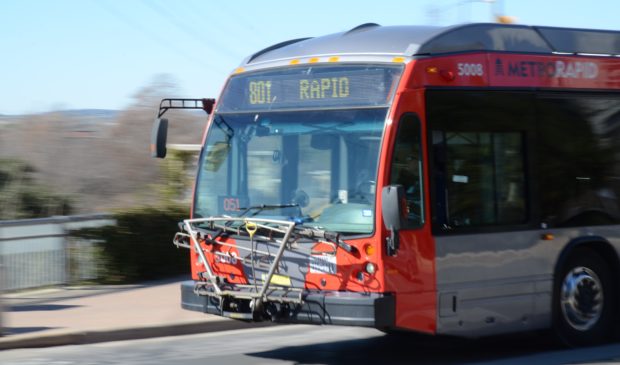Council hopes to reduce car use with two initiatives
Friday, December 14, 2018 by
Jack Craver At its last meeting of the year Thursday, City Council approved two measures aimed at encouraging people to get out of their cars.
One item, crafted by Council Member Delia Garza, instructs the city manager to put together a working group to consider a pilot program “that would address shifting modes of transportation by incentivizing transit use.”
Garza’s resolution suggests two potential incentives for transit ridership. One would provide discounts on city services and fees for those who can prove they have used transit 15 days in a month. Another would set up a program offering discounts at local businesses for those with Capital Metro transit passes.
The resolution also called on city staff to identify funds to support the incentive programs.
Council Member Ora Houston, who is leaving office at the end of the year, worried about the use of city funds for a program she considers the responsibility of Capital Metro, which is a separate government entity.
Houston noted that Council voted earlier this year to help the transit agency fund a corridor study for Project Connect. The $6 million allocated was the last of the “quarter-cent fund”– a portion of sales tax revenue that Capital Metro collected from 2001 to 2004 that it agreed to give the city for the construction of roads projects.
Houston said she worried about a “slippery slope” in which Capital Metro services would increasingly be funded “on the backs of property taxpayers.”
Garza didn’t see it that way. “This is for our city to address some of the big issues that we have,” she said. “I think it’s important that we as a city work with Cap Metro. We have the same issues.”
Council Member Ann Kitchen concurred: “This is not about one agency or another. This is about the community’s needs.”
The measure passed 6-2, with only Houston and Council Member Ellen Troxclair opposed and Mayor Steve Adler and Council members Pio Renteria and Jimmy Flannigan absent.
Council also approved a $450,000, three-year contract with Movability, a local transportation management association that helps employers connect workers with commuting options besides driving solo.
Since 2014, the city has partnered with Movability as part of the Mayor’s Mobility Challenge. The initiative motivates employers to create a mobility plan that will encourage workers to make their commutes more sustainable. So far, 69 companies have completed the mobility challenge or are in the process of crafting their mobility plans.
Houston, although supportive of the concept, wondered how the city could assess the impact of the program. Transportation Director Robert Spillar said that staff members are in the process of developing metrics to measure the program’s success.
The mobility challenge also stipulates that after developing their plans, participating employers take part in an annual certification process that involves documenting the success of the plan.
In an interview with the Austin Monitor, Movability executive director Lisa Kay said that employers pursue a range of approaches to getting workers out of their cars. In addition to providing education about available transportation options, some employers offer various incentives for commuting by transit, bike or foot. Others have begun operating private shuttles for workers.
Kay highlighted Cirrus Logic, a local semiconductor manufacturer, as having done a lot to encourage non-car commuting: “They have implemented all kinds of different benefits for their employees. They have provided private shuttles from neighborhoods to their employment site, from the downtown (MetroRail) station by the convention center to their employment site; they offer showers, bike lockers, they have memberships to various service providers. They are very proactive.”
Kay emphasized that Movability understands many people have no choice but to commute by car, either all or most of the time. The group’s aim, she said, is to help people find other ways to commute when possible, adding that just getting people to use their cars one day less a week can put a big dent in traffic congestion.
Photo by John Flynn.
The Austin Monitor’s work is made possible by donations from the community. Though our reporting covers donors from time to time, we are careful to keep business and editorial efforts separate while maintaining transparency. A complete list of donors is available here, and our code of ethics is explained here.
You're a community leader
And we’re honored you look to us for serious, in-depth news. You know a strong community needs local and dedicated watchdog reporting. We’re here for you and that won’t change. Now will you take the powerful next step and support our nonprofit news organization?











